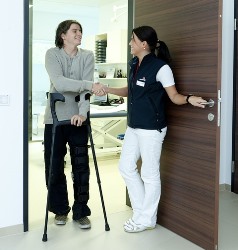How to Pick the Best LPN or LVN College Near Amherst Massachusetts
 Now that you have chosen a fulfilling vocation in the field of nursing, it's imperative that you find a Licensed Practical Nurse (LPN) school near Amherst MA that will provide the proper instruction. If you reside in Texas or California, then you will be searching for a Licensed Vocational Nurse (LVN) school instead. There is no difference, other than the names, between an LPN and an LVN. They both perform the same job functions and work in medical facilities under the guidance of Registered Nurses (RN) or Doctors. But their functions do fluctuate depending on the state they practice in, which we will address in the following segment. When initiating their search for schools, many potential nursing students begin with those that are the nearest to their homes or that are the least expensive. Even though cost and location are important factors, they are not the only criteria that you should base your decision on. Other concerns, such as if the schools are accredited or have high pass rates on the licensing exam are extremely important as well. There are additional questions that you should ask potential schools before enrolling in a LPN or LVN course that we will address later in this article. But first, let's look at the function of an LPN and what is involved in the education and licensing process.
Now that you have chosen a fulfilling vocation in the field of nursing, it's imperative that you find a Licensed Practical Nurse (LPN) school near Amherst MA that will provide the proper instruction. If you reside in Texas or California, then you will be searching for a Licensed Vocational Nurse (LVN) school instead. There is no difference, other than the names, between an LPN and an LVN. They both perform the same job functions and work in medical facilities under the guidance of Registered Nurses (RN) or Doctors. But their functions do fluctuate depending on the state they practice in, which we will address in the following segment. When initiating their search for schools, many potential nursing students begin with those that are the nearest to their homes or that are the least expensive. Even though cost and location are important factors, they are not the only criteria that you should base your decision on. Other concerns, such as if the schools are accredited or have high pass rates on the licensing exam are extremely important as well. There are additional questions that you should ask potential schools before enrolling in a LPN or LVN course that we will address later in this article. But first, let's look at the function of an LPN and what is involved in the education and licensing process.
It Only Takes a Few Minutes to Start Your LPN or LVN Career Below
What does an LPN or LVN Do?

Licensed Practical Nurses have a number of duties that they carry out in the Amherst MA health care facilities where they practice. As their titles indicate, they are mandated to be licensed in all states, including Massachusetts. Although they may be accountable for managing Certified Nursing Assistants (CNA), they themselves usually work under the supervision of either an RN or a doctor. The health care facilities where they work are numerous and varied, for example hospitals, medical clinics, schools, and long-term care facilities. Anyplace that you can find patients in need of medical treatment is their domain. Each state not only oversees their licensing, but also what work activities an LPN can and can't perform. So depending on the state, their day-to-day job activities might include:
- Checking vital signs
- Giving medicines
- Initiating IV drips
- Monitoring patients
- Collecting blood or urine samples
- Maintaining patient records
- Supporting physicians or Registered nurses with procedures
Along with their job responsibilities being controlled by each state, the health care facilities or other Amherst MA healthcare providers where LPNs work can further limit their job roles within those parameters. Also, they can work in various specialties of nursing, for example long-term care, critical care, oncology and cardiology.
LPN Certificates and Degrees
There are generally two academic credentials available that provide instruction to become an LPN or LVN near Amherst MA. The one that can be concluded in the shortest period of time, commonly about 12 months, is the certificate or diploma course. The other choice is to attain a Practical Nursing Associate Degree. These LPN programs are more comprehensive in nature than the diploma alternative and normally require 2 years to complete. The advantage of Associate Degrees, besides providing a higher credential and more in-depth training, are that they furnish more transferable credit toward a Bachelor's Degree in nursing. Regardless of the type of credential you seek, it needs to be state approved and ideally accredited by the National League for Nursing Accrediting Commission (NLNAC) or any other national accrediting organization. The NLNAC attests that the course of study properly prepares students to become Practical Nurses, and that the majority of graduates pass the 50 state required NCLEX-PN licensing exam.Attending LVN and LPN Online Classes
 Attending LPN programs online is growing into a more in demand way to receive training and acquire a nursing certificate or degree in Amherst MA. Some schools will require attendance on campus for a component of the training, and nearly all programs call for a certain amount of clinical rotation hours carried out in a local healthcare facility. But since the remainder of the training may be accessed online, this option may be a more accommodating answer to finding the free time to attend school for many students. Regarding tuition, many online degree programs are less costly than other on campus choices. Even other expenses such as for commuting and study materials can be minimized, helping to make education more economical. And a large number of online programs are accredited by U.S. Department of Education recognized organizations. And so if your job and family commitments have left you with very little time to pursue your academic goals, maybe an online LPN training program will make it more convenient to fit a degree into your hectic schedule.
Attending LPN programs online is growing into a more in demand way to receive training and acquire a nursing certificate or degree in Amherst MA. Some schools will require attendance on campus for a component of the training, and nearly all programs call for a certain amount of clinical rotation hours carried out in a local healthcare facility. But since the remainder of the training may be accessed online, this option may be a more accommodating answer to finding the free time to attend school for many students. Regarding tuition, many online degree programs are less costly than other on campus choices. Even other expenses such as for commuting and study materials can be minimized, helping to make education more economical. And a large number of online programs are accredited by U.S. Department of Education recognized organizations. And so if your job and family commitments have left you with very little time to pursue your academic goals, maybe an online LPN training program will make it more convenient to fit a degree into your hectic schedule.
Questions to Ask LPN and LVN Schools
Now that you have decided on obtaining your LPN certificate, as well as if you will attend classes on campus or on the web, you can utilize the following pointers to begin narrowing down your options. As you probably are aware, there are many nursing schools and colleges near Amherst Ma as well as within Massachusetts and throughout the United States. So it is essential to reduce the number of schools to choose from so that you will have a workable list. As we previously discussed, the location of the school as well as the price of tuition are most likely going to be the initial two points that you will take into consideration. But as we also stressed, they should not be your sole qualifiers. So prior to making your final decision, use the following questions to see how your pick compares to the field.
- Accreditation. It's a good idea to make sure that the certificate program in addition to the school are accredited by a U.S. Department of Education recognized accrediting agency. Aside from helping ensure that you receive an excellent education, it may assist in acquiring financial aid or student loans, which are frequently not offered for non-accredited schools near Amherst Massachusetts.
- Reputation. Visit internet rating companies to see what the reviews are for all of the LPN schools you are considering. Ask the accrediting agencies for their reviews too. Additionally, contact the Massachusetts school licensing authority to check out if there are any complaints or compliance issues. Finally, you can contact some nearby Amherst MA healthcare organizations you're interested in working for after graduation and ask what their judgements are of the schools as well.
- Internship Programs. The most effective way to acquire experience as a Licensed Practical Nurse is to work in a clinical setting. Essentially all nursing degree programs require a specified number of clinical hours be completed. Many states have minimum clinical hour mandates for licensing also. Check if the schools have associations with local Amherst MA community hospitals, clinics or labs and assist with the placing of students in internships. Also, it's important that you choose a school that offers clinical training in the type of facility you are most interested in. For example, if you want training and experience in pediatric care, make sure that the school you choose provides adequate clinical rotation in an area Pediatric Hospital.
- Licensing Preparation. Licensing requirements for LPNs are different from state to state. In all states, a passing score is required on the National Council Licensure Examination (NCLEX-PN) along with graduation from an approved school. Some states require a certain number of clinical hours be performed, as well as the passing of additional tests. It's imperative that the school you are enrolled in not only provides an excellent education, but also prepares you to comply with the minimum licensing standards for Massachusetts or the state where you will be working.
- Graduation and Job Placement Rates. Find out from the LPN schools you are looking at what their graduation rates are as well as how long on average it takes students to complete their programs. A low graduation rate may be an indication that students were dissatisfied with the program and dropped out. It's also imperative that the schools have high job placement rates. A high rate will not only verify that the school has a good reputation within the Amherst MA medical community, but that it also has the network of contacts to assist students obtain a position.
- NCLEX Exam Pass Rate. Once you receive your certificate or diploma, you must sign up for and pass the National Council Licensure Examination for Practical Nurses (NCLEX-PN). Enrolling in a school with at least a 75% pass rate is highly preferred. Lower pass rates may indicate that a school’s program, curriculum or instructors are ineffective in teaching its students. You can find out from the school what their passing rate is for the last 5 years, or request the information from the State Board of Nursing.
Learn How to Become an LPN or LVN in Amherst
Choose the Right Amherst Licensed Practical Nurse Training
Picking the ideal Licensed Practical Nurse school is probably the most crucial first step to launching a new career in the medical care industry. There are numerous variables that you must take into account when deciding on a nursing school. These factors will be prioritized differently depending on your current career goals, obligations, and economic situation. As we have pointed out within this post, it is important that you choose an LPN school and a certificate or degree program that are both accredited and have outstanding reputations within the medical community. By utilizing our list of qualifying questions, you will be able to create a short list of schools to select from so that you can make your final selection. And with the right degree and training, combined with your hard work and drive to succeed, you can become a Licensed Practical Nurse in Amherst Massachusetts.
AMHERST LPN OR LVN SCHOOLS NEAR ME | AMHERST LPN OR LVN COURSES
